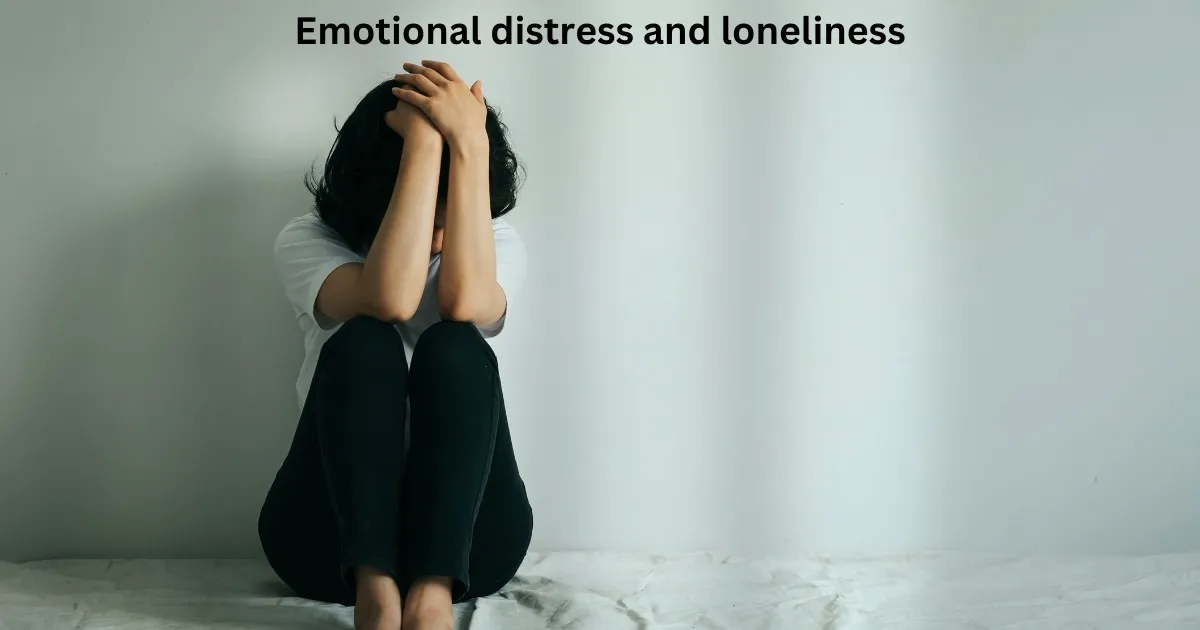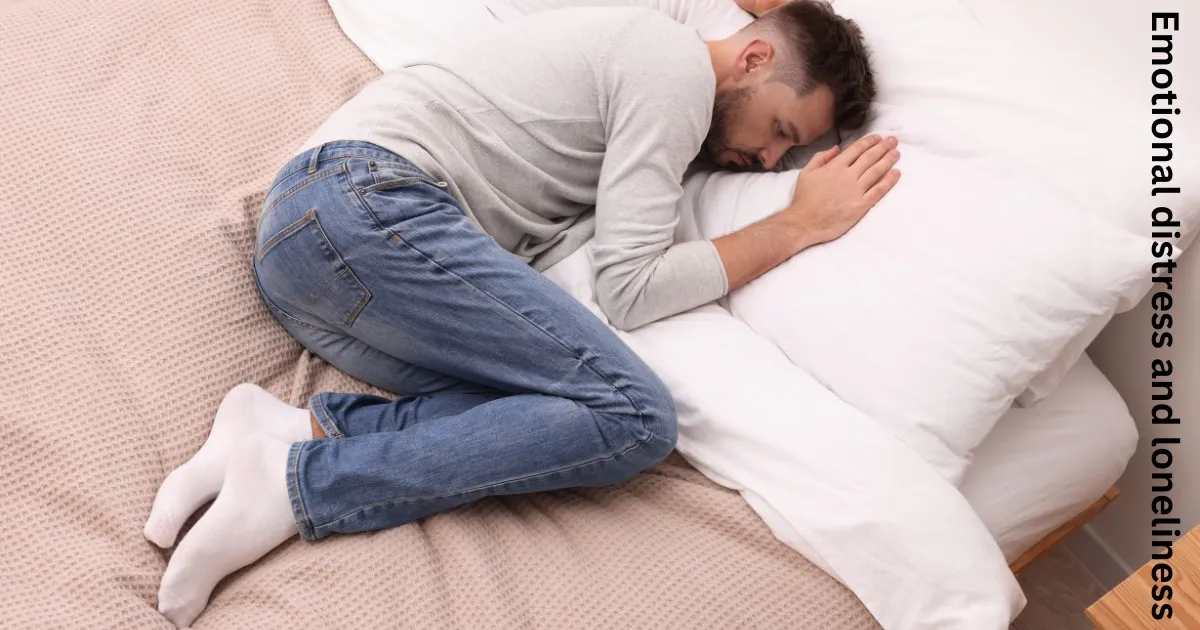Feeling depressed: Anxiety and sadness are among the most common mental health problems worldwide. Many individuals experience feelings of sadness, anxiety, and abandonment. Understanding the reasons behind these emotions is crucial for effective management.
People often experience sadness and anxiety due to personal experiences. For example, individuals who have undergone traumatic events may feel sorrow and anxiety triggered by memories associated with those events. Similarly, those who have faced rejection from loved ones may feel a sense of abandonment and loneliness.
It is important to recognize that the human brain is wired to respond to certain situations in specific ways. For instance, when faced with threats, the brain releases chemicals that induce feelings of sadness and anxiety as a response.
According to Wikipedia, sadness is characterized by emotions of disadvantage, loss, despair, grief, helplessness, disappointment, and sorrow. It is a natural human emotion that individuals experience at certain times in their lives. Feeling sad is a normal reaction to situations causing emotional upset or pain, as stated by Healthline.com.
Dealing With Overwhelming Emotions - What is Feeling Depressed?
Dealing with overwhelming emotions is a skill that can significantly improve emotional well-being. It involves recognizing, understanding, and managing intense feelings like anger, sadness, or frustration. Deep breathing exercises, meditation, and journaling can help regulate emotions.
Stress is a common occurrence in individual’s lives, resulting in occasional episodes of anxiety, panic attacks, and periods of depression. Restlessness and seeking treatment are common responses to address these mental health issues.
Feeling depressed, Chronic stress, anxiety, and depression can present significant psychological challenges, leaving individuals feeling helpless and profoundly sad. These conditions affect mood and have implications for overall well-being and long-term health. It is essential to differentiate between sadness and depression.
Feelings of Sadness and Anxiety: Anxiety To Sleep
Feelings of sadness and anxiety are common emotional responses that many individuals experience at some point in their lives. Sadness is a natural reaction to life’s challenges, losses, or disappointments, while anxiety can arise from various stressors.
When these feelings become overwhelming and persistent, they can significantly impact mental health. It’s essential to recognize that seeking support and understanding the root causes of these emotions is a crucial step toward healing. Strategies like talking to a therapist, practicing mindfulness, and engaging in self-care can help individuals manage and alleviate these emotions, promoting a more balanced and resilient mental state.
Anxiety often relates to sleep problems, with nighttime being a widespread time for anxiety to arise. Consequently, Anxiety can contribute to a vicious cycle of stress and poor sleep. Individuals experiencing nighttime anxiety may find it challenging to determine whether their anxiety prevents sleep or if the lack of sleep leads to anxiety.
Overcoming Feelings of Isolation:
Are you feeling depressed? Overcoming feelings of isolation is essential for maintaining good mental health. Loneliness and social isolation can contribute to a range of mental health issues, including depression and anxiety. Connecting with others, even in small ways, can help combat these feelings.
Joining social groups, engaging in hobbies, or volunteering are effective ways to combat isolation. Building a support network of friends, family, or support groups can provide a sense of belonging and purpose, reducing feelings of loneliness.
Feeling Depressed – Can Anxiety Cause Chest Pain?
Some people experience anxiety frequently; there are many examples of how chest pain is sometimes a symptom of stress. Chest pain associated with anxiety feels different for each person. Some people may experience chest pain on a gradual basis.
Loneliness and Its Impact on Mental Well-being
Loneliness is not merely a fleeting emotional state; it can profoundly affect mental well-being. Chronic loneliness is associated with an increased risk of depression, anxiety, and even physical health problems. It can alter brain functioning and contribute to feelings of worthlessness and despair.
Recognizing and addressing loneliness is essential for mental health. Building connections, seeking professional help when needed, and engaging in activities that foster social interaction are effective ways to mitigate the impact of loneliness on mental well-being.
Understanding that loneliness is a common human experience and taking proactive steps to combat it can improve mental health and overall quality of life.
Effective Ways to Deal with Emotional Pain and Isolation:
Emotional pain and isolation can be incredibly challenging, but there are effective strategies to cope with them. First, acknowledge your emotions without judgment. Accepting that you’re in pain is the first step toward healing. Then, reach out to trusted friends, family members, or a therapist to discuss your feelings. Connection is a powerful antidote to isolation.
Engage in self-care activities that soothe your mind and body, such as mindfulness, meditation, or creative expression. Physical activity can release endorphins and alleviate emotional pain.
Moreover, consider joining support groups or seeking professional help if needed. These resources can provide guidance and understanding. Remember, healing from emotional pain takes time, so be patient with yourself and practice self-compassion.
Overwhelming Emotional Pain – Signs of Depression and Anxiety:
When faced with overwhelming emotional pain, effective coping strategies are essential. Start by allowing yourself to feel the emotions fully without suppressing them. Journaling can help you gain insight into your feelings and their root causes. Deep breathing exercises and meditation can regulate intense emotions.
Physical activity, even a short walk, can release tension and improve mood. Reach out to a trusted friend or therapist for support and perspective. It’s crucial to challenge negative thought patterns and practice self-compassion.
Avoid self-destructive behaviors and instead focus on self-care. Seeking professional help is a proactive step toward managing overwhelming emotional pain. Remember, you don’t have to go through it alone; help is available.
Unlocking the Mysteries: Understanding Sadness, Anxiety, and Abandonment
Anxiety and sadness are common mental health issues globally. Understanding the underlying reasons behind these emotions is crucial for effective coping strategies.
Personal experiences as triggers: Sadness and anxiety often arise from personal experiences. For instance, individuals who have faced trauma may experience these emotions due to lingering memories. Similarly, rejection by a loved one can lead to feelings of abandonment and loneliness.
Biological response: The human brain is wired to respond to specific situations in predictable ways. When faced with threats, the brain releases chemicals that induce feelings of sadness and anxiety.
Defining sadness: Sadness is an emotional state characterized by feelings of disadvantage, loss, despair, grief, helplessness, disappointment, and sorrow. It is a natural reaction to emotional upheaval or pain experienced by all individuals at specific points in their lives (Healthline.com).
Stress and its impact: Occasional bouts of anxiety, panic attacks, and phases of depression often arise from severe stressors in life. Seeking appropriate treatment can help address these mental health issues.
Chronic stress and its consequences: Prolonged stress, anxiety, and depression can lead to psychological challenges, leaving individuals feeling helpless and profoundly sad. These conditions affect mood, overall well-being, and long-term health. It is essential to distinguish between sadness and depression.
Anxiety and sleep disturbances: Anxiety is frequently associated with sleep problems, particularly during the night. The cycle of anxiety and poor sleep can be challenging to break, making it difficult to determine whether anxiety causes sleep disturbances or vice versa.
Chest pain and anxiety: Anxiety can manifest as chest pain in some individuals. The experience of chest pain associated with anxiety may vary from person to person.
Healthy strategies for managing sadness: When experiencing sadness, it is essential to allow oneself to feel and process emotions. Sadness can indicate unexpected changes or the need for personal transformations. Additionally, maintaining physical fitness can positively impact mental well-being.
Addressing anxiety and sadness: Seeking professional help is crucial for individuals dealing with stress and sadness. There are various treatment options available to cater to specific needs.






Feeling the weight of sadness and anxiety? You’re not alone. Many of us grapple with these emotions, and it’s okay to admit it. Let’s break the silence and start the conversation.
Your article helped me a lot, is there any more related content? Thanks!
Feeling sad, anxious, and abandoned can be overwhelming. You are not alone. This post delves into the common causes and offers practical solutions.
The experiences of sadness, anxiety, and feelings of abandonment are complex and deeply personal. These emotions can arise from a variety of causes and have a profound impact on mental and emotional well-being
Listen and offer support!!
I’ve noticed a direct link between my stress levels and how I eat. It’s a tough cycle to break